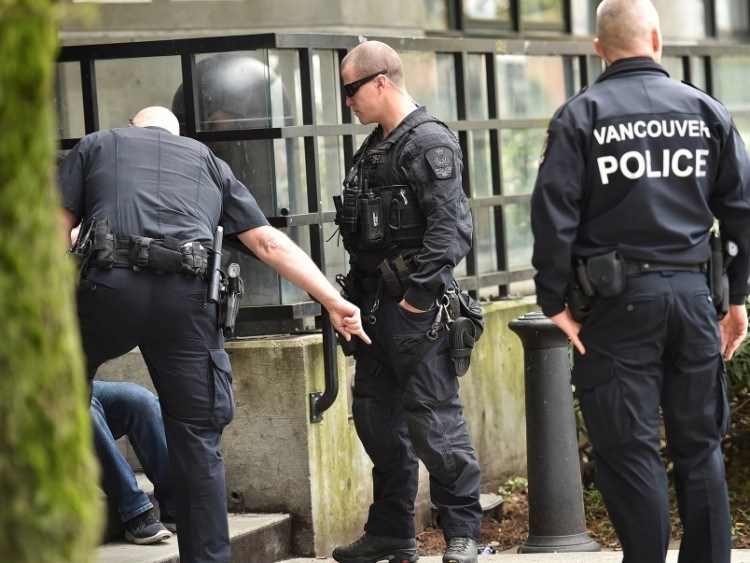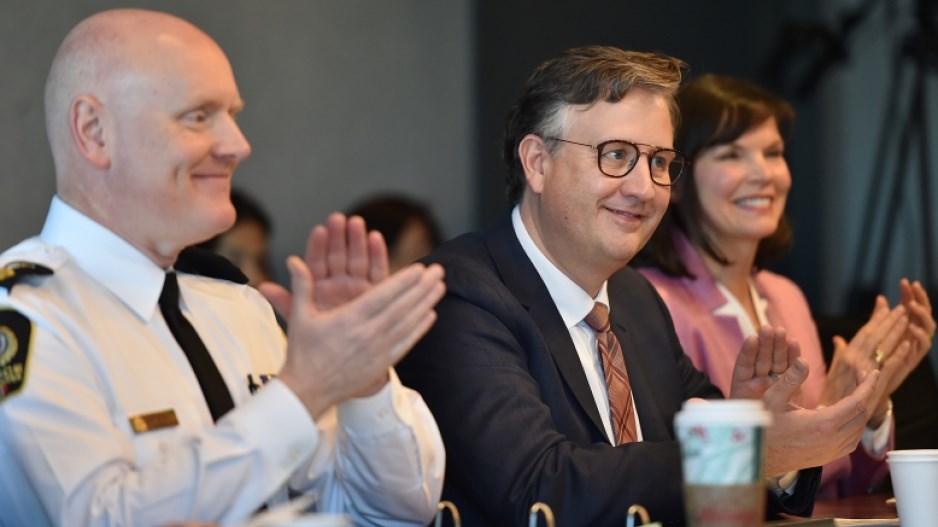Vancouver city councillors were unanimous Wednesday in supporting a motion from Mayor Kennedy Stewart that urges the Vancouver Police Board to end the practice of police “street checks” in the city.
The move builds on a separate motion that police board member Rachel Roy intends to put forward in September that will request an internal review of the Vancouver Police Department’s new street check policy adopted in January.
Roy, a lawyer who specializes in labour and human rights law, gave verbal notice of her intent at the board’s June 25 meeting and added that such a review should consider whether Vancouver officers should be banned entirely from using street checks.
The board’s next public meeting is scheduled for Sept. 17.
Until then, Stewart said the hope was his motion would trigger a board member to bring forward a separate motion to abolish street checks. Roy’s motion — if accepted — isn’t that pointed, and it will be up to the board to determine how it wants to proceed.
The board has already committed to an annual audit of the VPD’s new street check policy, which may occur in January or February of next year. How Roy’s request for an internal review would affect that audit is unclear.
“It’s time to abolish street checks in Vancouver,” the mayor said in his closing comments to council. “I do think that this motion passing at council would go a long way to convincing board members to do the same thing.”
Stewart acknowledged Wednesday that council doesn’t have the authority to direct the police board to ban street checks. But he noted the Police Act states the board has to take council’s priorities, goals and objectives into account, but is not obligated to act on them.
Council’s move further complicates Stewart’s role as chairperson of the police board, a position he automatically assumed when elected mayor in October 2018.
The mayor cannot introduce motions at the board and can only vote in the event of a tie.
Stewart made it clear that his motion was not directed at the leadership of Police Chief Adam Palmer, who he said is recognized widely as the top police chief in Canada. He also stated Palmer has taught him the most about policing.
“When I became mayor, and thus chair of the police board, I knew quite a lot about local government but nothing about policing,” Stewart said. “It has been a very educational journey for me.”
That said, his drive to abolish street checks in Vancouver was based largely on police data showing checks are weighted disproportionately towards minorities, especially Black and Indigenous people.

File photo: Dan Toulgoet
A street check, as defined by the VPD, is when an officer encounters someone believed to be involved in criminal activity or a suspicious circumstance and documents the interaction.
Several residents, including Latoya Farrell, who spoke to council Wednesday talked about being arbitrarily stopped by police in a practice that she and others have argued has no basis in law and should be banned.
Farrell, a Black woman and lawyer with the B.C. Civil Liberties Association, told a story of being stopped by police one night after leaving a studio at about 3 a.m. She was walking home and officers told her to stop.
“I was asked where I was coming from, where I was going, what was I doing, who I was, where did I live and a series of questions that left me thinking internally, ‘Why was this happening?’’’ she said. “I wasn’t doing anything. I was confused. And even knowing my rights, and even knowing that I was not obliged to answer these questions, I felt like I had no choice.”
Added Farrell: “Standing alone on that street by myself at 3 a.m. with two police officers, and no one around to witness, no one around to film, I felt afraid. I can feel my heart racing now thinking about it.”
The mayor’s motion comes after almost two years of debate in the community and several reports — independent and within the VPD — that examined whether street checks are discriminatory towards a certain race of people.
The B.C. Civil Liberties Association and the Union of B.C. Indian Chiefs began questioning the practice after data posted on the VPD’s website in 2018 showed police conducted 97,281 street checks between 2008 and 2017.
Of those checks, 15 per cent (14,536) were of Indigenous people and more than four per cent (4,365) of Black people. Indigenous people make up just over two per cent of the population in Vancouver, and Black people less than one per cent.
Those statistics, the two organizations argued, suggested street checks were discriminatory and should be banned. Their concerns led to an internal review from the VPD that concluded what Palmer had told media prior to the release of the results in September 2018 — that the practice is not discriminatory.
Even so, the department recommended the police board adopt six recommendations, including additional training for officers, releasing street check data annually and assigning an officer to improve communication with the Indigenous community.
Formalizing the department’s street check standards into policy so that it adheres with new provincial standards under development at the time was another recommendation.
Since then, the VPD adopted a new street check policy Jan. 7 to meet the B.C. government’s new guidelines and standards for all police departments regarding the practice of stopping and checking citizens.
The policy makes it clear that an officer cannot stop someone randomly or based solely on “an identity factor” such as race, social or economic status, religion, ancestry and sexual orientation.
Other measures in the policy include an officer having a specific public safety purpose to ask a person for identification and must inform the person of that reason. An officer must also ensure a person is aware of their rights during a street check.
That policy was adopted in advance of an independent report conducted by Pyxis Consulting Group Inc. on the practice of street checks, which was released in February.
The report was unable to conclude whether Vancouver officers were motivated by racism or bias when stopping a person on the street.
“This review of street checks, consistent with other [Canadian police department] reviews, found that the available data and information could neither confirm nor deny police racism or bias,” the consultant’s report said. “Additionally, considering only the disproportionality of individuals in the street check data could not be used to confirm or deny the existence of bias.”
However, not all information from the draft report from Pyxis was included in the final report, including allegations made by researchers that two Vancouver police officers made racist and inappropriate comments during ride-alongs.
A copy of the draft report obtained by Glacier Media under the Freedom of Information and Protection of Privacy Act expands on the allegations, but does not name the officers.
Some of the section in the report related to the allegations is redacted.
“On one ride-along…one of the officers made a number of inappropriate, racially insensitive comments to the researcher and his partner throughout the shift,” the report said. “These comments were extremely inappropriate and highly concerning. An officer on another ride-along also made a number of inappropriate comments about vulnerable and marginalized people, and appeared to have considerable anger issues. When interacting with members of the public, he was overly terse and, on one occasion, extremely rude.”
Added the report: “While these officers were clear exceptions, their behaviour and attitude were highly concerning and something the VPD needs to address.”
Const. Tania Visintin, a VPD media relations officer, told Glacier Media in an email last month the allegations are under investigation. Meanwhile, Visintin said street checks continue to be a “valuable proactive crime prevention tool” for police, even though they are used infrequently.
“They are not random or arbitrary checks,” she said, noting the number of street checks decreased 91 per cent when compared with the previous year. “If this trend continues throughout the year, it will equate to less than one street check per frontline officer in a calendar year. In comparison, for every street check conducted, there are 500 calls for service for police.”
In the VPD’s review of street checks in 2018, the report concluded it was “unrealistic and overly simplistic to expect racial and gender populations to align uniformly with crime data.”
For example, the report said, women make up about half of the population and men make up the other half. However, men commit approximately 80 per cent of crime, the report said.
In addition, the overrepresentation of specific groups within street check data is “not unique to visible minority communities,” said the report, noting that Caucasians made up 46 per cent of Vancouver’s population in 2016, but accounted for 57 per cent of street checks.
The police data collected between 2008 and 2017 showed a total of 3,988 street checks of Indigenous females. Police said 53 per cent of those checks were of females reported missing.
@Howellings




